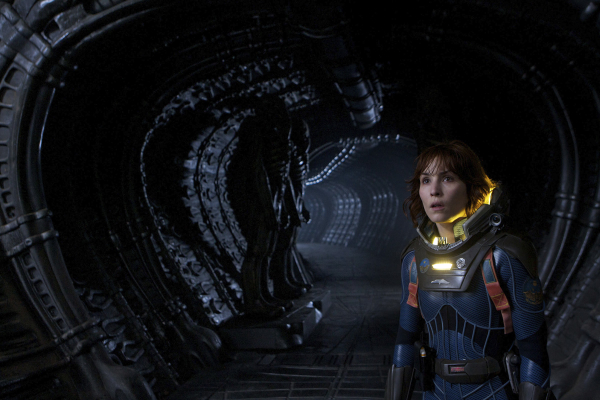Movie review by Greg Carlson
When Ridley Scott disingenuously began claiming that “Prometheus” was not, in fact, a prologue to his much loved and imitated “Alien,” the desired result within the community of fanatics (to whom these things matter a great deal) was a steep increase in curiosity about the nature of his big-budget, large-scale return to science fiction. Whether prequel, reboot, or extension, “Prometheus” certainly exists in the same world as “Alien,” even if several differences and inconsistencies have raised the ire of the most intense geeks. Without tempered expectations, however, “Prometheus” unsurprisingly fails to live up to the promise of its mother – one of the tightest Old Dark House movies ever made, and alongside “Blade Runner,” Scott’s finest achievement as a filmmaker.
“Prometheus” is not the work of a hungry auteur as much as it is a played-safe recapitulation that loots the memorable riches of “Alien.” Of course, the asinine merger of the franchise with the “Predator” series was like putting sardines in a milkshake. Complete with a calm, erudite android, a crazy quilt crew introduced in stasis/hyper-sleep, a visit to a mysterious planet, a derelict spaceship, a chamber filled with ominous containers, sinister corporate overtones, aggressive monsters, flamethrowers, extreme body horror, iconography indebted to H.R. Giger’s biomechanical designs, and narrow shuttle escapes, “Prometheus” shares an awful lot with the 1979 classic. What it does not share is much interest in cultivating an air of discovery, and the metaphysical yearning expressed by central archeologist Elizabeth Shaw (Noomi Rapace) is somehow far less compelling than whatever motivated the keener instincts of Ellen Ripley.
While the plotting of “Prometheus” mimics “Alien,” many of the movie’s central thematic concerns dovetail with those present in “Blade Runner.” An obsession with the very essence of human creation informs both titles, and “Prometheus” quotes “Blade Runner” dialogue about meeting one’s maker more than once. Like Eldon Tyrell’s bottomless, Frankensteinian hubris at the achievement of genetically engineering replicants that are “more human than human,” Peter Weyland sees robot David as a son, inspiring a jealous reaction from Charlize Theron’s Meredith Vickers, who ends a scene with “father” enunciated in a manner that echoes Roy Batty’s famous “fucker/father” epithet to Tyrell. As the “Lawrence of Arabia”-loving David, Michael Fassbender has described drawing on Sean Young’s Rachael, and the actor’s presence is the highlight of the movie.
Beyond Scott’s self-borrowing, “Prometheus” claims an assortment of influences. Original “Alien” screenwriter Dan O’Bannon freely admitted the breadth of his inspirations, and “Prometheus” is no less dependent upon some of the usual suspects. While a complete chronicle may be impossible to tally (see Govindini Murty’s impressive account for “The Atlantic”), John Milton’s “Paradise Lost,” H.P. Lovecraft’s “At the Mountains of Madness,” Mario Bava’s “Planet of the Vampires” (which in turn was based on Renato Pestriniero’s story “One Night of 21 Hours”), Stanley Kubrick’s “2001: A Space Odyssey,” and several classic tales and myths that touch on the theme of obtaining something forbidden and paying for it (Prometheus, Faust, the expulsion of Adam and Eve from the Garden of Eden, and “Frankenstein”) form the beginning of a long list. Disappointingly, Scott’s film, in spite of the grandeur of its arresting visuals, cannot fully measure up to the allure of all these stimuli, hampered as it is by the frustrating folly of inexplicably illogical actions and mouthfuls of subpar dialogue.
